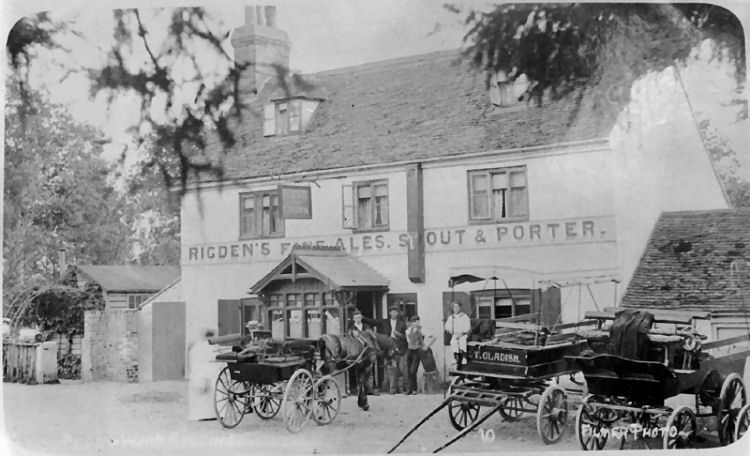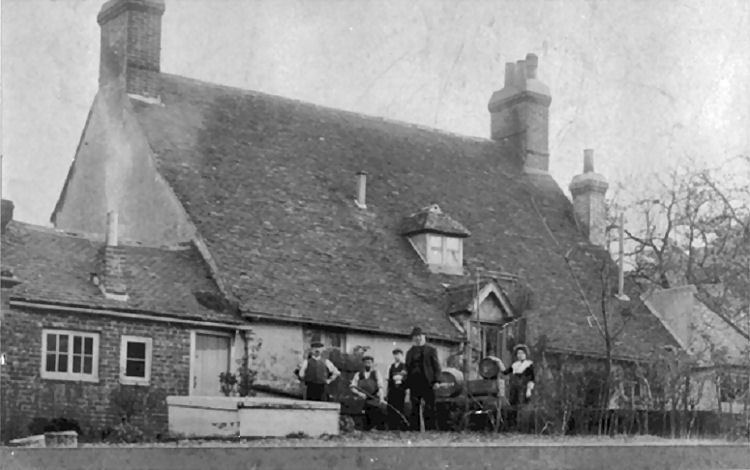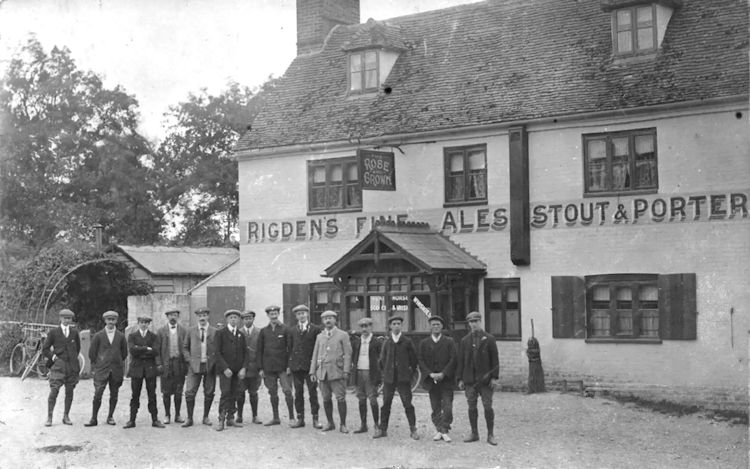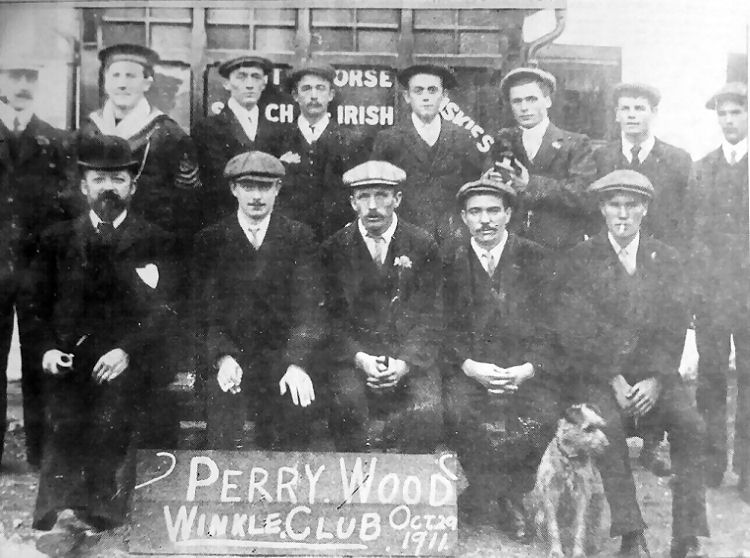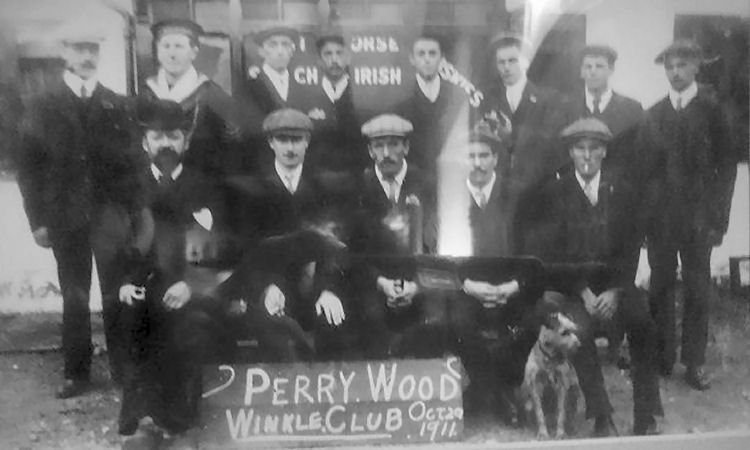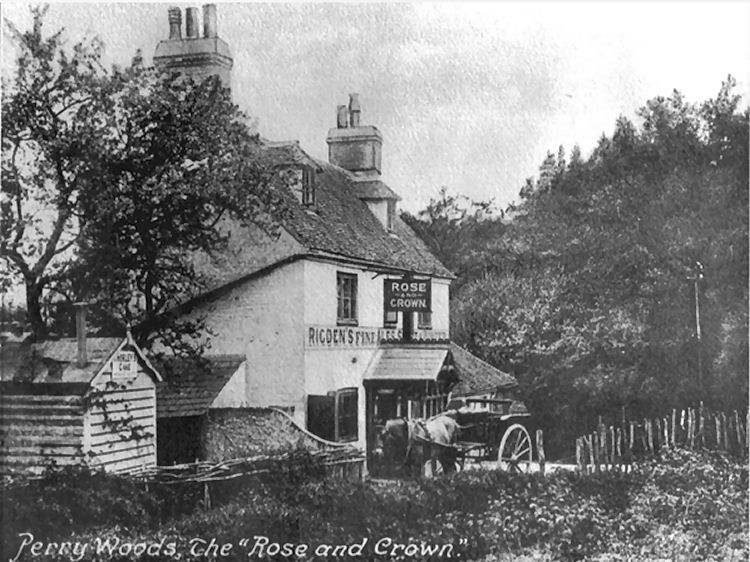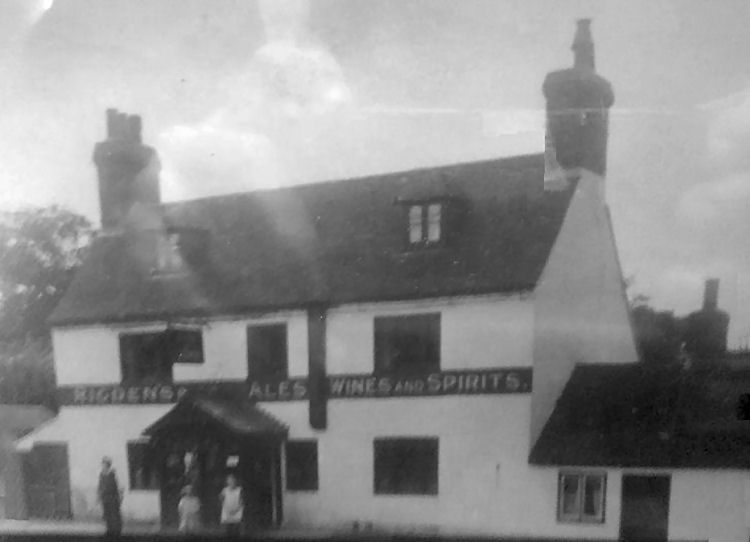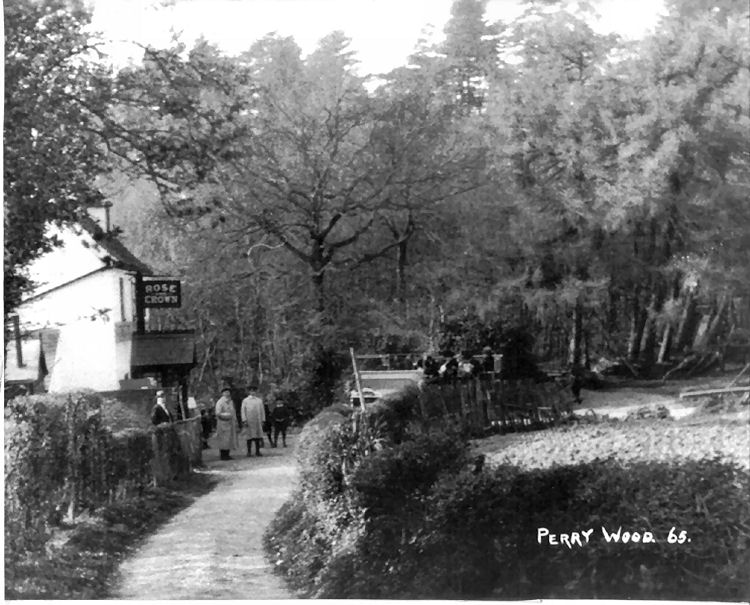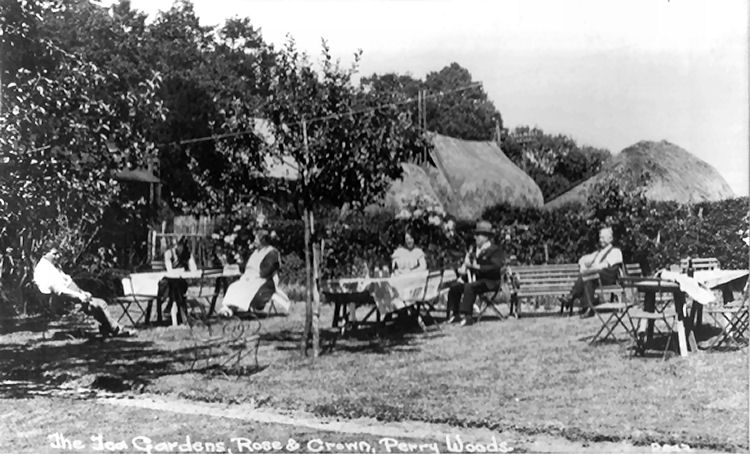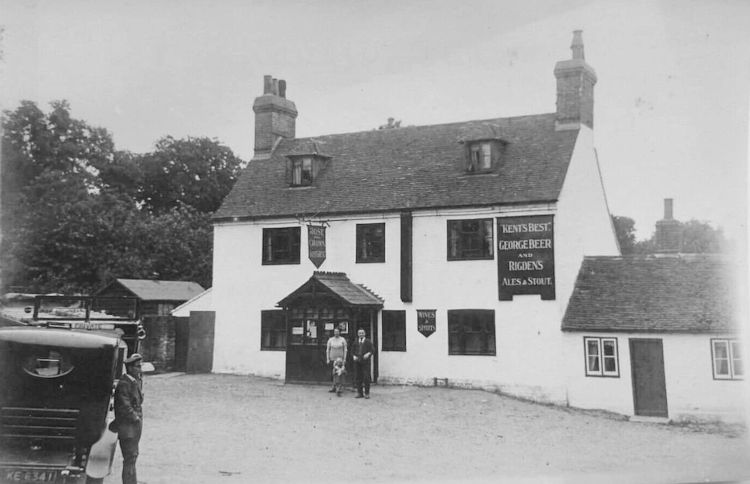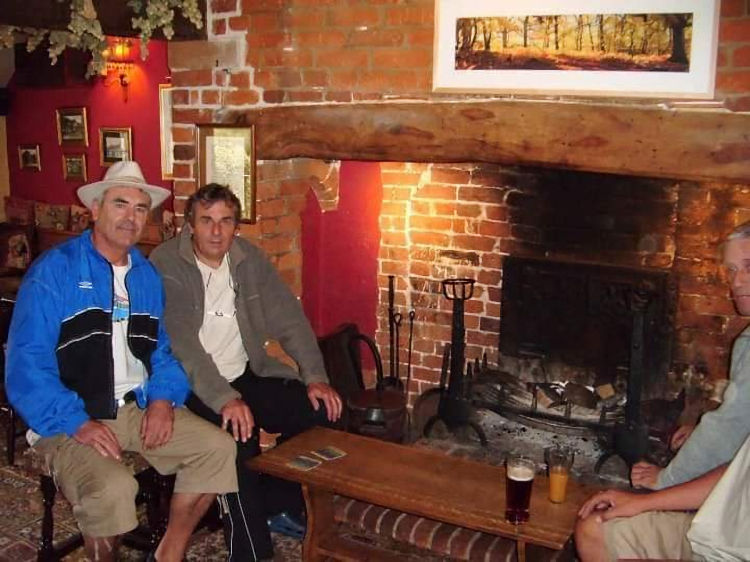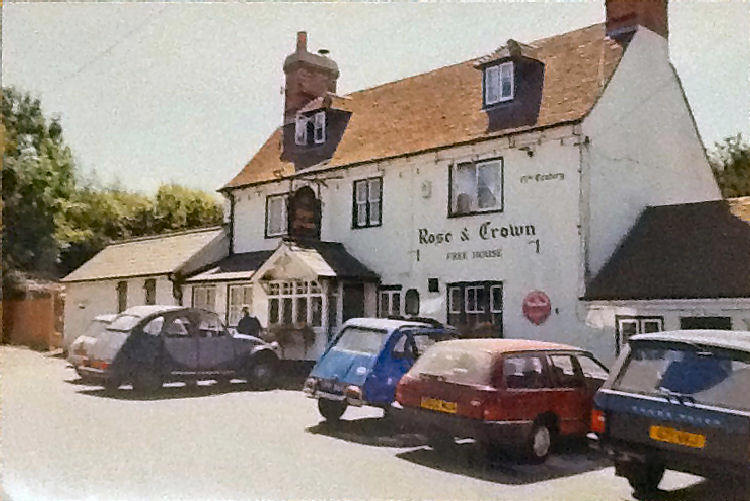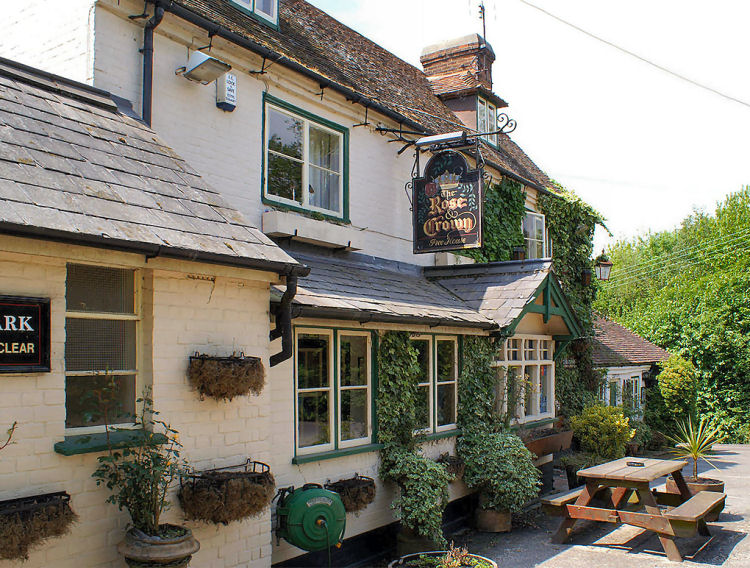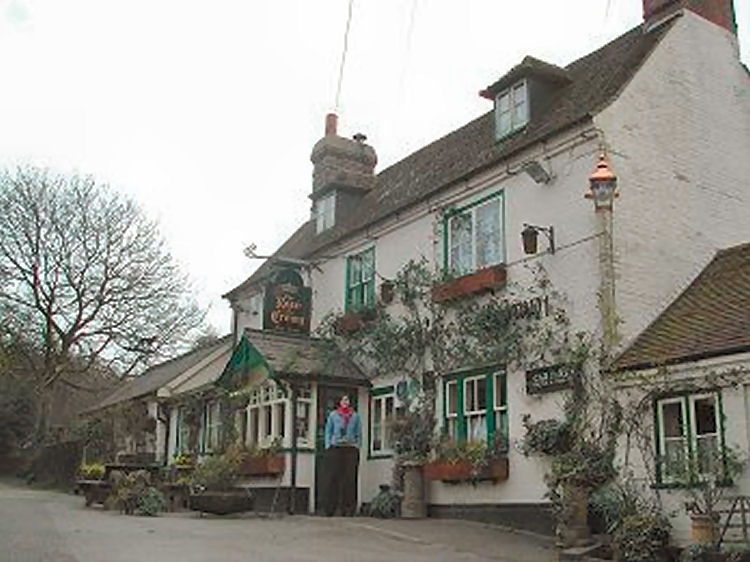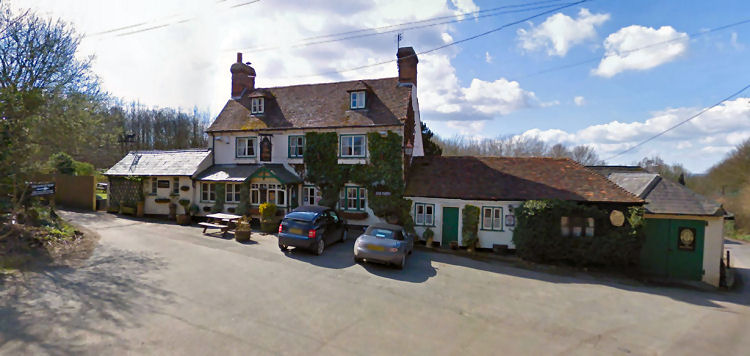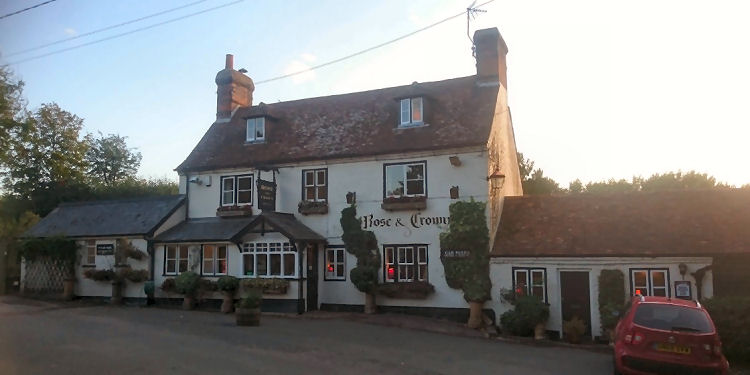|
Canterbury Journal, Kentish Times and Farmers' Gazette.
Saturday 21 December 1889.
The alleged murder at Selling.
Joseph Packman, aged 55, and James Foster, 28, labourers, were
indicted for the wilful murder of Hammond John Smith, at Selling, on the
29th August last.
Mr. Dering and Mr. Rosher were for the prosecution, and Mr. Biron and
Mr. Murphy defended, at the request of the Judge.
Mr. Dering having briefly opened the facts, called the following
witnesses:-
John William Marsh, landlord of the "Rose and Crown," Sheldwich,
deposed that on the afternoon in question he saw the prisoners, who were
strangers to him, in his house. He also saw Thomas Hopkins there between
4 and 5, and also the deceased, who came into the house between 4:30 and
4:45 o'clock. During the afternoon Foster went out to seek for work, and
came back at about 6:30 o'clock. He remained in the house until 9
o'clock, and then left with Packman, bidding Smith and witness
"Goodnight," shaking hands with both. Five minutes after Smith left by
himself, and Hopkins went out half an hour afterwards in company with
Daniel Linkins. Witness saw no more of the men that night.
Cross examined by Mr. Biron:- During the whole of the evening he did
not notice any fighting in his bar. Most of the customers were in the
tap room, including Foster and the other men. There was no quarrelling
in the tap room, but Foster, Hopkins, and Smith had a discussion as the
which could cut and tie up corn the fastest. The discussion took place
at 6:30 o'clock when Foster had come back. When prisoners left they
appeared to be on the best possible terms with Smith, who left about
five minutes after they were gone. He was sure of that.
His lordship told the witness to shut his eyes and say when 5 minutes
have passed.
The witness underwent the operation, and when he had his eyes closed
some little time his lordship asked "Well, how far have we got now."
Witness:- I don't know, my lord. (Laughter.)
The Judge:- Well, what should you think?
Witness:- About three and a half minutes.
His Lordship:- You are not so very far out.
Mr. Murphy:- By my stopwatch the time is one and a half minutes.
(Laughter.)
Cross-examined (resumed):- Hopkins left with Daniel Linkins, whom he
came back to fetch.
Cross-examined by Mr. Murphy:- There was a w.c. at the back of the
house accessible to anyone.
Thomas Hopkins, living at Chilham, deposed that deceased had been
working for him, and at the time of his death, he was working for Mr.
Minter. Between 3:30 and 4 o'clock witness went to the "Rose and Crown."
Shortly after that Smith left the house, but while he was there the
prisoners came in. He heard a dispute about cutting corn and witness
said he would mow anyone an acre of corn for a Sovereign. Packman said
he would accept the challenge, and will put the money down. Witness said
he would not do that, but will cut him an acre when he liked. Smith and
Foster then got talking about who could tie up the fastest, and they
each called the others "monkeys." That led to one or the other of them
saying I will go outside and see which was the monkey man. They were
then angry, and went outside and had two or three rounds together, in
the road near the house. That was soon after 6 o'clock. They took their
coats off, but not their shirts. Smith said to Foster when they close
were off "Are you ready?" Frost replied "Yes," and then they fought, and
Smith, who was a more powerful man than Foster, knocked the latter down
twice and got the best of the fight. Witness then persuaded them to go
indoors, and when they were going in Foster seized Smith by the scarf
and gave him a smack in the nose, making it bleed. He also tore the
scarf. Smith did not return the blow, but said he did not like the scarf
being torn because his sister made it, and it cost him 3s. 2d. He
repeated that in an angry tone to Foster several times. The song or two
then followed, but the jangling about the scarf was carried on, and
witness went away to see to his horses. When he returned the jangling
was still going on. He heard them call one another monkey men again, and
then witness persuaded them to be quiet. At about 9 o'clock Foster and
Packman left, bidding them all good night. Smith was there in tap room.
Witness went out a quarter of an hour afterwards. Smith left 5 or 10
minutes after prisoners, and before witness went out. As soon as he got
out he heard of struggling over the way in the road, about 16 or 18
yards from the inn. It was dark and witness could not see what was going
on. He crossed the road and saw Smith lying on his back, with Foster
trying to bang into him with his knees. Packman stood nearby close to
his feet. After 2 minutes Smith turned over onto his right side, Foster
being still on him, and Smith cried out, "Leave off, Jem, for I have had
enough of it, help me." Foster kept banging into him making a hissing
noise through his teeth, and he heard Foster say "I will kill you, you
_______, before I have done with you." Witness then went to pull Foster
off, when his hand slipped, and he fell backwards, Foster then said "Who
is that b______ interfering with me?" and Packman said "I don't know who
the _____ is; I will keep him away, you give him (Smith) what he wants,
and then get up and serve the other one the same." Foster still kept
banging into Smith's back and making a hissing noise. Just before he
left off Smith said "The _______ is stabbing me." Foster than came to
attack witness, but seeing him, he said "Oh, it's you, Hopkins, I don't
want to interfere with you." Both Foster and Packman had got their coats
off.
By the judge: The prisoners picked up their hats and clothes and were
soon off.
Witness went into the "Rose and Crown" for assistance as Smith's
elder brother who was there would not come. Daniel Linkins came out, but
when they went across the road Smith was gone, and they could not find
him although they shouted for him. He went into the stable about 9:55
o'clock, but Smith, who was in the habit of sleeping there, was not
there then.
By Mr. Dering:- The next morning he saw a pool of blood where the
struggle took place. On going to his stable at 5:45 o'clock he found
Smith in a shed next to his stable where witnessed cut his greenmeet. He
looked into the shed the night before, but Smith was not there then. He
found Smith covered up with some sacks and bags, lying where he laid a
good many times. He took the deceased some tea, but not thinking there
was anything seriously the matter with him he did not go for a doctor.
Deceased did not say anything to him when he gave him the tea. The
prisoners and deceased were all sober on the previous night. I did not
see any knife or weapon in Foster's hand, it was too dark.
Cross examined by Mr. Byron:- Could not say whether Smith was first
to use the expression "Monkey man. He said before the coroner that's
Smith knocked Foster down two or three times. At the close of the fight
Foster said to Smith "You are a better man than I am, we will go in and
have a pint together," and they went in and had a drink together. It was
a vicious blow that Foster gave to Smith after the fight, as they were
going into the house. When Smith was on the ground and Foster on him
witness heard him say "Do help me Jem" by which he must have meant by
Foster or Packman. He did not see a man named Beck standing by at the
time, but he did see a man named Gammon standing at his gate while the
assault was going on. He did not ask Gammon to assist him pulling Foster
off Smith. He did not know that the assault had had such a serious
result at the time of its occurrence.
Cross examined by Mr. Murphy who defended Packman:- There was no
quarrel between Packman and Smith, who were very friendly at the "Rose
and Crown." He had no idea a knife was being used, it was too dark to
see it.
Re examined by Mr. Dering:- When witness try to pull Foster off Smith
someone struck him knocked him down.
By the Judge:- Smith was in the habit of joking and larking, and
witnessed thought he was joking when he said he was stabbed. He was a
great big powerful fellow, and a little too fond of showing his
strength.
George Beck, a labourer, living at Selling, deposed that he lived
about 25 yards from the "Rose and Crown," and on the evening in question
he saw prisoner come out of the public house and stand in the road a few
minutes about 10 or a dozen steps from the door. In a few minutes
afterwards Smith came out and witness heard him say something about
tearing his scarf, but he did not appear to be angry. He said heard
Foster say "You called me a monkey man," and then Foster rushed at him
and punched him with his fists. The next he saw Smith on the ground
lying on his face, with Foster "banging" on him. He heard Foster say two
or three times "I will kill you, you _______, whilst Packman was
standing at his feet, saying "Give it to the _______ now you have got
him." He saw Hopkins go to Smith's assistance and try to pull Foster
off, when he slipped and fell. Foster came to witness and struck at him,
and then went to Hopkins, to whom he said "Oh, it's you, Hopkins, I
don't want to interfere with you." He did not hear anything said by
Smith while he was on the ground.
By the judge:- He saw prisoners walk away, after which Smith got up
and went towards the wood. The prisoners bode witness "Good night" as
they passed him.
Re-examined by Mr. Rosher:- He saw a pool of blood in the road next
morning.
Cross-examined by Mr. Biron:- Prisoners were 15 yards off witness
when the assault was going on, and it was very dark. He could not see
distinctly what happened, but he heard more than he saw. When Foster
said that Smith had called him a "monkey man" the last replied "So are
you."
Thomas Gammon, father-in-law of the last witness, spoke to seeing the
deceased and Foster fighting at 6 o'clock. Later in the evening he heard
Smith say, when on the ground, "You've done it, you've done it, you've
done it!" and then Foster said "You ______; I will kill you." At his
daughter's request he blew a whistle to bring assistance. The next
morning he covered the blood up in the road.
Cross-examined:- He knew Smith and had worked with him, so that he knew
his voice very well. He did not think there was anything serious going
on, having seen so many of the drunken fights and squabbles.
The Judge:- I hope they don't all fight in this way in Kent.
James Hopkins, son of the previous witness of that name, deposed that
on the morning after the occurrence he saw in the road a pool of blood,
a hat, a piece of a shirt sleeve, an umbrella, and three bills
(produced). [It was stated that the bills belong to Foster.] When he got
his father's stable he found Smith lying on his left side near to one of
the horses. Witness helped him into the next shed and laid him on some
sacks and put some more sacks over him. That was shortly after 4
o'clock. At 10 o'clock he found Smith dead where he had left him.
Cross examined by Mr. Biron:- He did not think deceased was much hurt
when he was, or he should have sent for medical assistance.
Thomas Lamprill, a labourer, living at Sheldwich, deposed that he
went to the stable on the morning of the 21st, and found deceased lying
with his head over a tub; witness took hold of his hand and found him
quite dead.
P.C. Anderson, K.C.C., deposed on the 21st August he went to Hopkins
shed at about 11 o'clock and found the body of the deceased in a
crawling position. There were cuts in the back of his waistcoat and
shirt, both being stained with blood. he examined the body and found 12
stab wounds. He found blood in the road opposite the "Rose and Crown"
and in a field near. He also traced blood to Hopkins' stable, and at the
back he found deceased's coat, in which there were no cuts. He then went
to Mr. Winters field and apprehended the prisoners, who were cutting
corn. On telling them the charge Packman said, "Is he dead?" Witness
replied, "He is," and then Packman said, "I know nothing about it; I did
not know anything about it until my mate told me this morning." Foster
said, "I did not kill him." Witnessed asked him, "How do you account for
that blood on your undershirt?" To which he rejoined, "That came from my
nose; Smith gave me a punch in the nose last night, and you would not
like a punch in the nose for nothing, would you?" He then told them to
turn out any knives they have got, and Packman gave him the one produced
(a large shut knife.) On searching Fosters dinner bag lying here at the
time witness found the knife produced (a black handled knife.) Witness
ask Foster if that was all the knives he had and he replied "Yes, and I
did not have that knife with me yesterday." He then took the prisoners
to Faversham Police Station, and afterwards, in company with another
Constable, he went to Fosters house at Boughton and found on the shelf
there a very large pocket knife, which was wet, as though recently taken
out of the water. There were on it what appeared to be blood stains.
[The knife was handed to his lordship.]
Cross examined by Mr. Biron:- He did not take down the prisoners
statement in writing. He searched Fosters house between 3 and 4 o'clock.
Inspector Fowle, Faversham, deposed that on 21st August the last
witness delivered the prisoners into his custody, and when he charged
them Packman said "I was there, but no one did not see me do anything."
Foster made no reply. He examined Packman's clothes, but found no blood.
On Fosters clothes he found blood on his undershirt, braces, and
neckerchief. He accounted for the blood by saying that a man hit him on
the nose at Perrywood yesterday, and that caused it. Foster told him
that the braces, undershirt, and neckerchief were what he was wearing on
the day before. On examining prisoners house he found trousers, shirt,
and strap, which were wet as though they had been recently washed, but
there were stains on the clothing which she believed to be blood stains.
While Foster was in his custody at the inquest he said "I will take my
oath I never stabbed the man, and the knife you have there I have not
had since Sunday."
Cross-examined by Mr. Biron:- The knife was an ordinary labourers
knife, such as were turned out by the hundred.
By the Judge:- He did not find any cuts on the prisoner Foster, but
there was a slight scratch on one of his ears, which might have been
caused by a blow. On the back of the fingers on one of his hands there
were cuts which prisoner said he got two or three days before in
sharpening the scythe.
His lordship ordered the knife on which there were alleged to be
blood stains to be microscopically examined by the county analyst.
The prisoners statement before the magistrates were then put in and
read, the effect of Foster's being that he did not stab the deceased,
and that of Packman's was that he was totally unaware that when Foster
was on Smith on the ground he was using a knife.
Mr. Walter Scatchard, surgeon at Boughton under Blean, was next called,
and he deposed that he had, in company with Mr. Adams, made an
examination of the knife, under the microscope, and found on it what
appeared to be corpuscles of blood of some mammal, but the tests have
not been sufficiently complete to enable him to swear positively. It
would take all the afternoon to complete the test. The marks were more
distinct on the handle of the knife. At present he wasn't able to say
whether the blood was human. It was not that of a bird or fowl. The
witness then proceeded to describe the result of the post mortem
examination. He saw the deceased lying in an outhouse, minus his shirt,
but with his trousers on. He was a well nourished man, and on his back
were 11 wounds, cutting right through all the skins; all were on the
left side of the spine, except two. [Witness indicated on the usher of
the court the position of the wounds on the deceased body.] Nearly all
the wounds were in the same direction and at about the same length, but
they varied in death. All the internal organs were healthy, but one of
the lungs was full of blood. Between the 11th and 12th rib there was a
wound right through the body, and through which he could put his finger.
No doubt the haemorrhage produce from that wound. He attributed death to
the lowest wound on the left side, all the wounds appeared to have been
produced by the same instrument. The small blade of the knife produced
would have caused the whole of the wounds on deceased's body.
Cross-examined:- If he had been called in directly after the wound
had been inflicted he did not think he could have saved the man's life.
He could not have stopped the internal bleeding. There were only two of
the wounds that were serious. It was the bleeding from the lower wounds
which caused the lung to collapse, and thus produced death.
Mr. Dering here withdrew the charge of murder against Packman, and
said he could not ask the jury to find the prisoner guilty of anything
more serious than manslaughter. He could not contend that he absolutely
knew that Foster was using a knife when he had Smith on the ground. He
then proceeded to some of the evidence for the prosecution, and
submitted that it left the jury no option but to find the prisoner
Fosters guilty of murder, he having received no provocation sufficient
to justify him in the use of the knife.
Mr. Biron next addressed the jury on behalf of Foster, remarking that
he did not intend to say that Smith did not meet his death at the hands
of the prisoner, but he thought he should succeed in showing them that
there were circumstances which would reduce the crime to that of
manslaughter. He then proceeded to review the evidence which he
contended would justify the jury in saying that the deed was committed
in hot blood, and under such circumstances of provocation as reduced the
crime to that of manslaughter, and which Smith, who was the stronger and
better man of the two, brought the assault on himself. He suggestion was
that Smith drew the knife in self-defence, and Foster took it from him,
and that the deceased sustained the wounds in the back during the
rough-and-tumble struggle which followed.
The jury acquitted Packman and found Foster guilty of manslaughter.
He was sentenced to 14 years' penal servitude, the Judge telling him
that the crime of which he had been convicted was as near murder as it
was possible to be. Had he left off beer probably this would never have
happened.
|
|
Illustrated Police News 31 August 1889.
ALLEGED MURDER NEAR FAVERSHAM.
The coroner's jury who were called together at Perry-wood, near
Faversham, to inquire into the death of Hammond John Smith, a labourer,
who was on Tuesday night subbed in twelve places during an affray near
the "Rose and Crown, having returned a verdict of wilful murder, the two men in custody—James Packman, fifty six, of Dunkirk, and James Foster, twenty-eight of Boughton, were on Saturday brought up at the Faversham County
Police-court, when the magisterial inquiry was proceeded with before Mr.
W. E. Rigden.
The evidence of the several witnesses went to show that on
Tuesday afternoon deceased and the prisoners were at the "Rose and
Crown," Perry Wood, though not together. They subsequently were there in
the evening, and Smith (the deceased) and Foster quarrelled, and agreed
to fight. They went out stripped, and had three rounds, Foster being
knocked down twice. In the third round they closed and fell together.
When Foster got up he said that Smith was too good a man for him, and
asked Smith to go into the house again and have some beer. On the way in
Foster seized Smith's neck handkerchief, tore it in two, and threw it
back to him, and although they were drinking together Smith seemed vexed
about the scarf being torn. Soon after nine o'clock the two prisoners
got up and went out, and a few minutes afterwards Smith went out too.
Prisoners were still outside, and deceased spoke to Foster about tearing
the scarf, when Foster said, "You called me a monkey man." Smith
answered, ''And so you are;" whereupon Foster rushed at him, and got him
down on the ground and kneeled on top of him. He appeared to be punching
him, and Smith called out, "Do help me, Jim," and presently turned over
and said, "I have had enough, let me alone." Foster repeatedly said,
"I'll kill you before I leave you." Packman said to Foster, "Give it to
him now you have got him." A dealer named Hopkins, who came out of the
"Rose and Crown" and saw the struggle, tried to pull Foster off Smith,
whereupon Packman threatened him, and said to Foster, "I'll keep him
away till he (Smith) has had enough, and then you get up and serve the
other man the same. "After this Smith called out that Foster was
stabbing him. None of the witnesses saw a weapon. A whistle was blown by
Thomas Gammon, who lives in a cottage a few yards away, and Foster got
up. The deceased still lay on the ground calling for help. No one
rendered him any aid, a circumstance upon which the magistrates severely
questioned one or two of the witnesses, and upon which the coroner
animadverted on Friday. Hopkins said that he was sober, and so were
prisoners and deceased, so far as he knew. Early on Wednesday morning
the deceased was found in Hopkins's stable, sixty yards from the scene
of the affray, which was marked by pools of blood, and here there were
also picked up a hat, and umbrella, the sleeve of the deceased's shirt,
which was torn off, and three beer scores made out in the name of
Foster. Hopkins and his son both saw the deceased and gave him some and
assisted him to the chaff lodge, where they placed him on some bags and
covered him up. He complained of being chilly. Hopkins, in answer to the
magistrate, said he did not send to Smith's friend, for he did not think
Smith had been hurt so much. Lamprill, a labourer, went to the stable,
and found Smith dead. The same day Police-constable Anderson apprehended
the prisoner on a charge of murder. Foster's under vest, braces, and
scarf had blood upon them, and at his cottage a shirt, trousers, coat,
and handkerchief were found, some in water and some having just been
taken out. A pocket knife was found on a shelf, having apparently been
recently taken from the water. There was a mark of blood near the rivet.
Dr. Scatchard said he found twelve incised wounds, one on the left side
and eleven on the back, nine of which were on the left of the spine. The
wound that caused death was between the tenth and eleventh ribs. Foster
had made a statement to the inspector of police that he did not stab
deceased, although they fought together. The evidence having been taken,
Superintendent Mayne asked for prisoners to be remanded for a week. They
were accordingly remanded, all the witnesses being bound over to appear
again.
|
